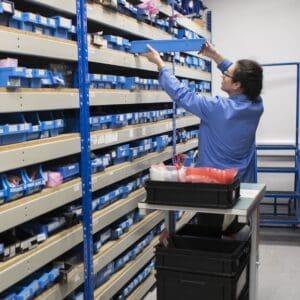
UPLINK AMPLIFIERS
Reliable high-power amplifiers for the satcoms industry
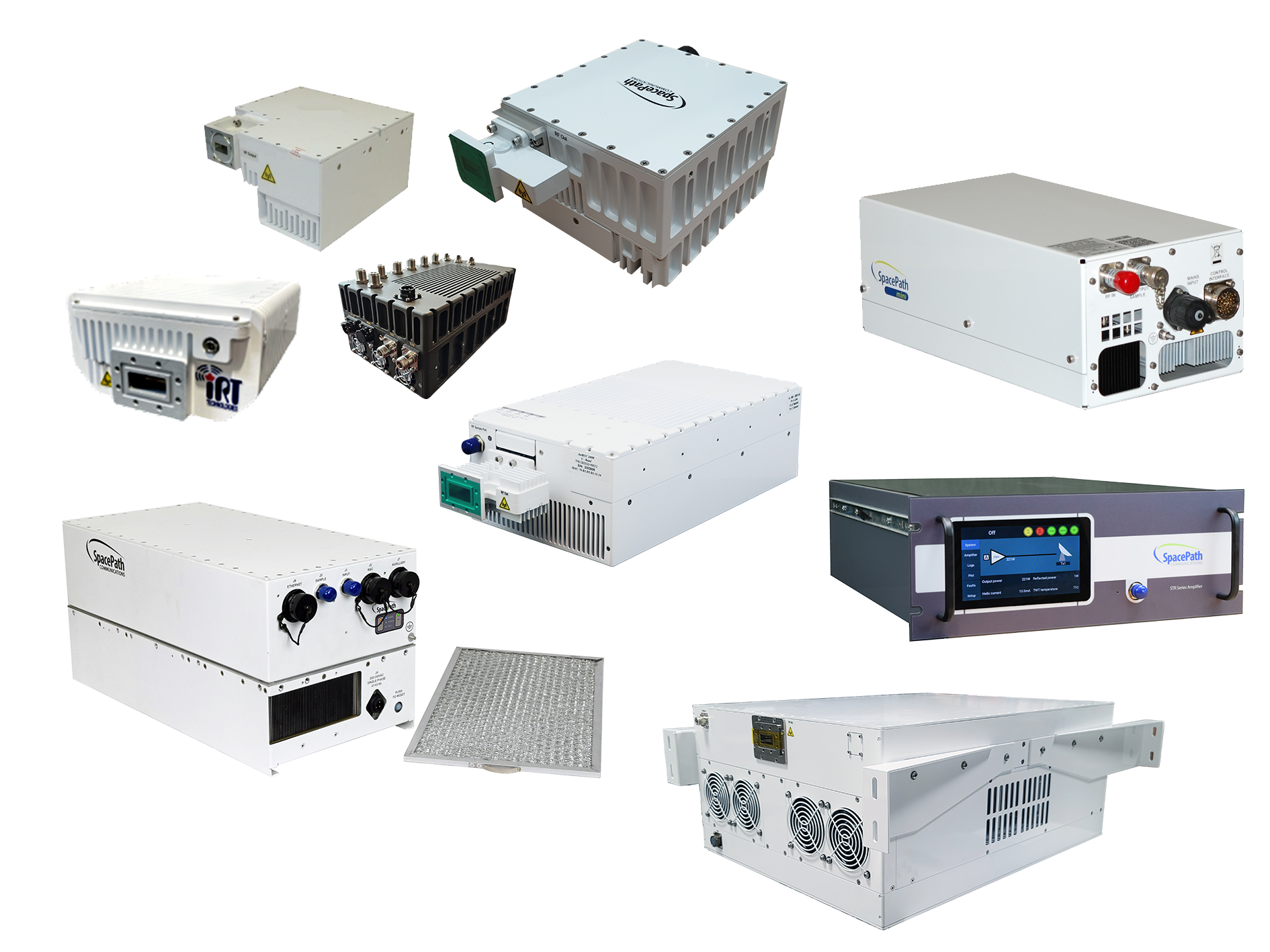
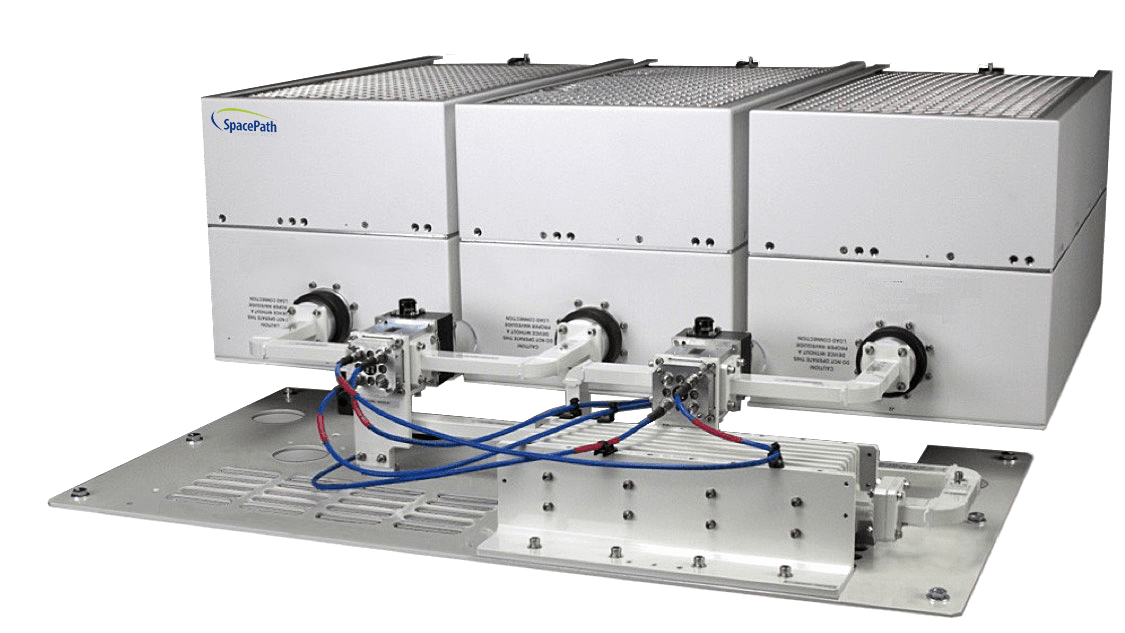
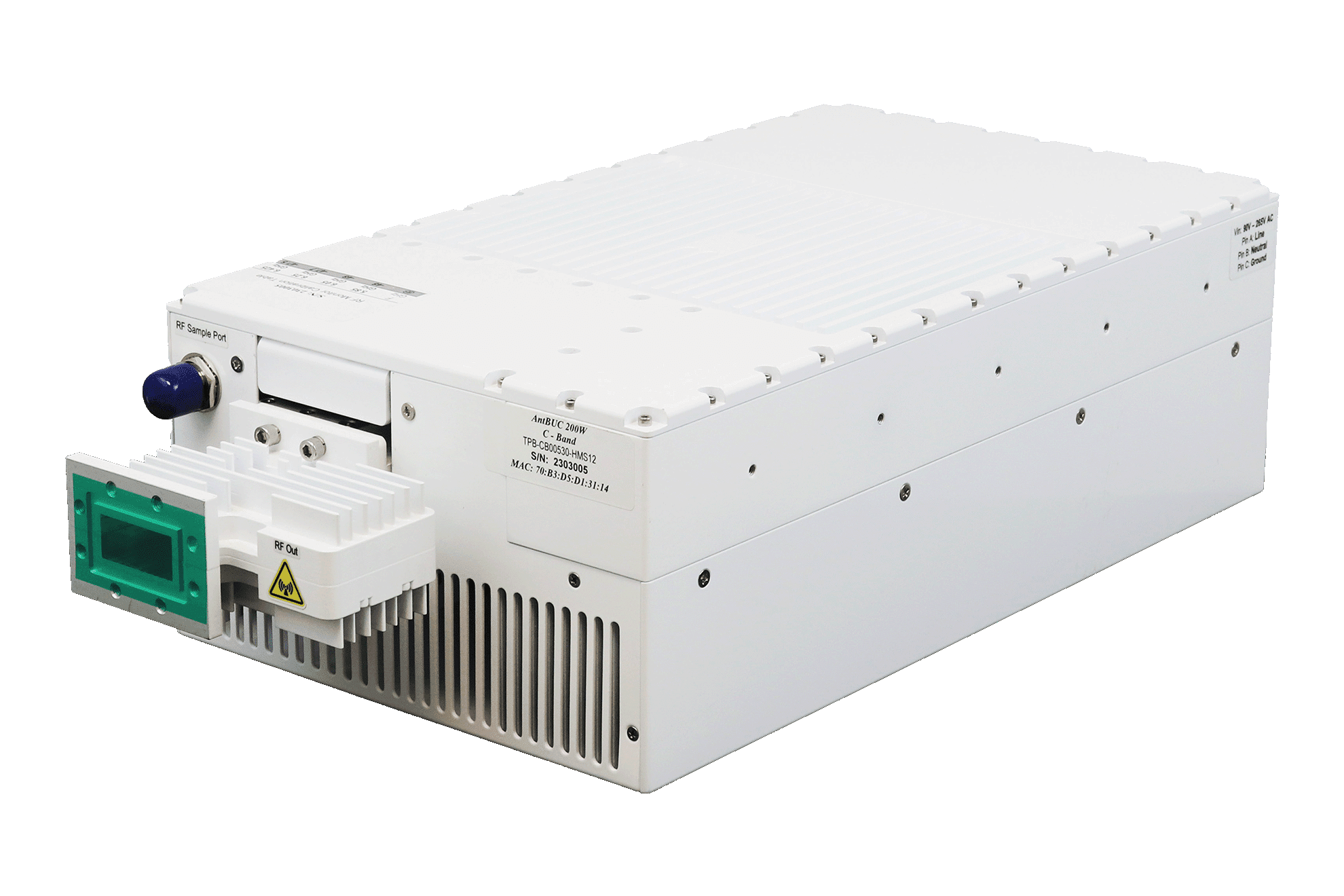
High-Power Amplifiers
Designed for mission-critical applications
Our high-power amplifiers (HPAs) are reliable solutions for mission-critical applications. Our extensive portfolio of RF HPAs includes travelling wave tube amplifiers (TWTAs), solid-state power amplifiers (SSPAs), redundant system controllers, and sub-systems.
These are powerful solutions tailored to real-world customer needs. Designed by industry-leading experts, this diverse range has rapidly become a trusted provider among system vendors across the international satcoms market.

Widest HPA range on the market

Covers Ka and V-band

Quick and easy installation, even for redundant systems
TWTAs or SSPAs – What’s the difference?
Travelling wave tube amplifiers (TWTA)
TWTAs use vacuum tube technology to amplify RF signals, offering high power output, wide bandwidth, and efficiency at high frequencies (above 10GHz). They are commonly used in satellite communications due to their ability to handle high peak power. However, they are larger, require high voltage, and have a limited lifespan compared to solid-state alternatives. Despite their higher cost and maintenance needs, TWTAs remain the preferred choice for high-frequency, high-power applications where efficiency and bandwidth are critical.
or
Solid-state amplifiers (SSPA)
SSPAs use semiconductor technology (e.g., GaN or GaAs transistors) to amplify RF signals, offering high reliability, compact size, and better linearity. They are commonly used in satellite communications, radar, and broadcasting, particularly in lower-frequency and digital applications. While they typically provide lower power output than TWTAs, they are more efficient at lower frequencies, require less maintenance, and have a longer lifespan. SSPAs are ideal for applications where reliability, efficiency, and cost-effectiveness are key considerations.
The widest HPA range on the market
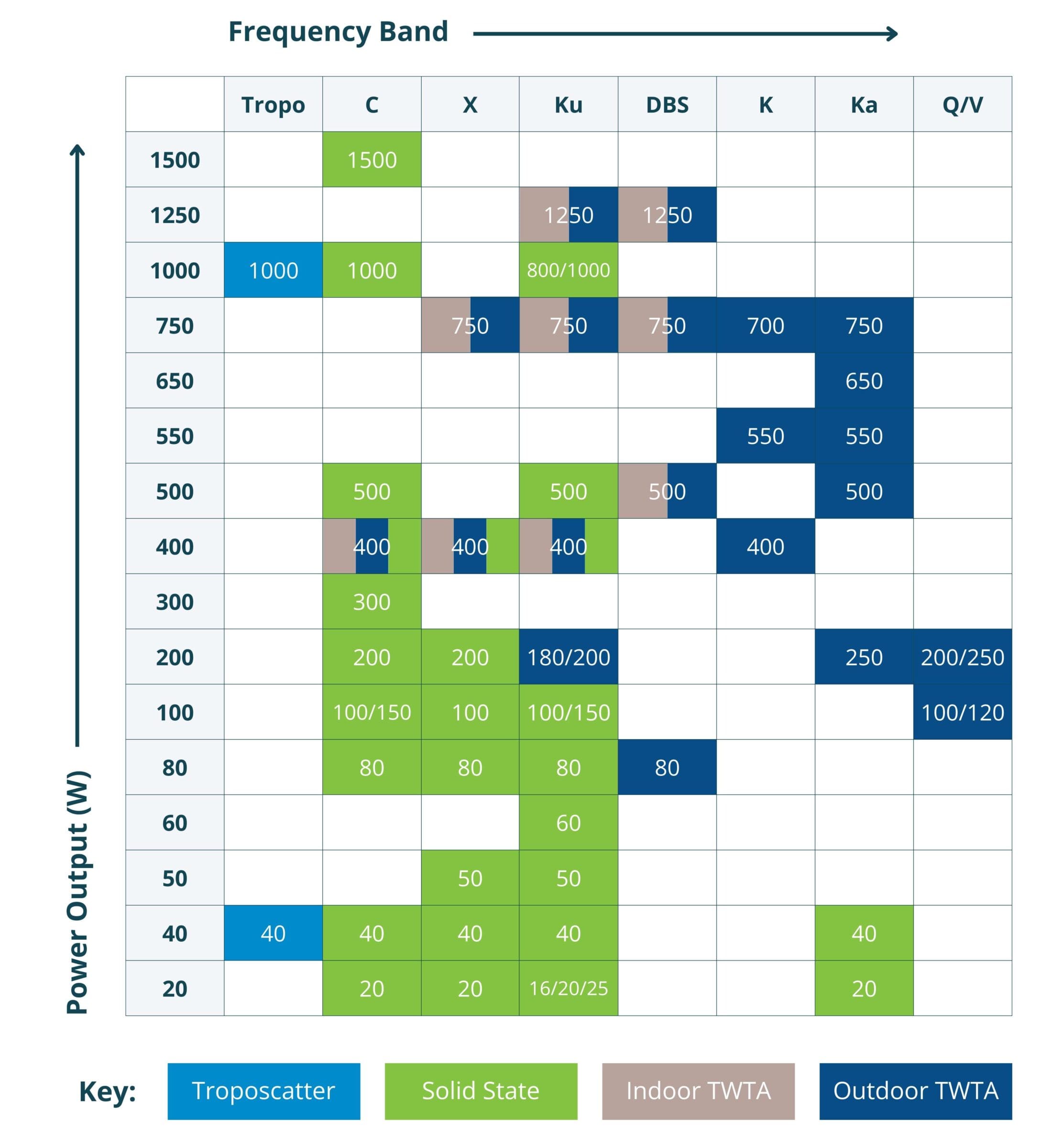
ETL’s range of high power amplifiers offers comprehensive coverage. These amplifiers are the most compact and lightweight available, as much as 40% smaller and lighter than competitor products. They offer modern design with common parts, reducing cost burdens for spares and maintenance across the range. The amplifiers feature flexible protocols to allow interoperability with other manufacturers’ products, and we provide a proactive support service. For customer ease, our redundancy systems are provided ready for tool-free installation, and the units can be easily installed/removed with a few simple movements.
Travelling wave tube amplifiers (TWTA)
Outdoor TWTA product range
Outdoor TWTAs are engineered to consistently deliver reliable, high-efficiency performance in any environment. The comprehensive range of high-power amplifiers supports all mission-critical satellite communication segments, including digital satellite newsgathering (DSNG), military satellite communications, large teleports, mobile applications and flyway systems.
- C-Band options from 400-750W output power
- X-Band options from 400-750W output power
- Ku-Band options from 180-2500W output power
- DBS-Band options from 76-2500W output power
- K-Band options from 400-550W output power
- Ka-Band options from 250-750W output power
- Q-Band options from 180-190W output power
- V-Band options with 250W output power
- Forward and reverse power monitoring
- Circulator recive band and harmonic filters
- Wide mouth power supply
- Local control panel
- Ethernet port/web browser control
- Redundancy control (up to three waveguide switches)
- Removable filters
- Internal BUC (optional)
- 10 MHZ autosense reference (optional)
- Linearisers (optional)
Name & Datasheet | Frequency (GHz) | TWT Power (W) | TWTA Power (W) | TWT Type | Size (mm) | Weight | Model No. |
5.850-6.425 5.850-6.650 5.850-6.725 5.850-7.025 6.725-7.025 | 400 | 350 | CW | 280H x 588L x 254W | 25kg | STA6140 | |
5.850-6.425 5.850-6.650 5.850-6.725 5.850-7.025 6.725-7.025 | 750 | 675 | CW | 280H x 620L x 260W | 25kg | STA6175 |
Name & Datasheet | Frequency (GHz) | TWT Power (W) | TWTA Power (W) | TWT Type | Size (mm) | Weight | Model No. |
7.90-8.40 | 400 | 365 | CW | 271H x 588L x 254W | STA6240 | ||
7.90-8.40 | 750 | 650 | CW | 271H x 588L x 254W | STA6275 |
Name & Datasheet | Frequency (GHz) | TWT Power (W) | TWTA Power (W) | TWT Type | Size (mm) | Weight | Model No. |
12.75-14.50 13.75-14.50 13.75-14.80 | 180 | 150 | CW | 132H x 348L x 183W | 9kg | STA3318 | |
13.75-14.50 12.75-14.50 13.75-14.80 12.75-13.25 | 400 | 180 | PEAK | 432L x 216W x 216H | 16kg | STA4340P | |
13.75-14.50 12.75-14.50 13.75-14.80 12.75-13.25 | 400 | 350 | CW | 254H x 508L x 254W | 21kg | STA5340 | |
13.75-14.50 12.75-14.50 13.75-14.80 12.75-13.25 | 750 | 675 | CW | 508L x 254W x 254H | 21kg | STA5375 | |
13.75-14.50 12.75-14.50 13.75-14.80 12.75-13.25 | 1250 | 565 | PEAK | 508L x 254W x 254H | 21kg | STA53125P |
Name & Datasheet | Frequency (GHz) | TWT Power (W) | TWTA Power (W) | TWT Type | Size (mm) | Weight | Model No |
17.30-18.10 17.30-18.40 | 85 | 76 | CW | 348L x 183W x 132H | 9kg | STA3408 | |
17.30-18.10 17.30-18.40 | 500 | 420 | CW | 520L x 254W x 254H | 21kg | STA5450 | |
17.30-18.10 17.30-18.40 17.30-17.80 | 750 | 675 | CW | 520L x 254W x 254H | 21kg | STA5475 | |
17.30-18.10 17.30-18.40 17.30-17.80 | 1250 | 565 | PEAK | 508L x 254W x 254H | 21kg | STA54125P |
Name & Datasheet | Frequency (GHz) | TWT Power (W) | TWTA Power (W) | TWT Type | Size (mm) | Weight | Model No. |
22.50-23.50 | 400 | 250 | PEAK | 520L x 260W x 260H | 21kg | STA5940P | |
22.50-23.50 | 550 | 340 | PEAK | 520L x 260W x 260H | 21kg | STA5955P |
Name & Datasheet | Frequency (GHz) | TWT Power (W) | TWTA Power (W) | TWT Type | Size (mm) | Weight | Model No. |
27.5-30.0 27.0-30.0 28.0-30.0 30.0-31.0 | 250 | 110 | PEAK | 440L x 220W x 220H | 16kg | STA4525P | |
27.5-30.0 27.0-30.0 28.0-30.0 30.0-31.0 | 385 | 135 | PEAK | 440L x 220W x 220H | 16kg | STA45385P | |
27.5-30.0 27.0-30.0 28.0-30.0 30.0-31.0 | 500 | 425 | CW | 520L x 260W x 260H | 21kg | STA5550 | |
27.5-30.0 27.0-30.0 28.0-30.0 30.0-31.0 | 500 | 250 | PEAK | 520L x 260W x 260H | 21kg | STA5550P | |
27.5-30.0 27.0-30.0 28.0-30.0 30.0-31.0 | 550 | 250 | PEAK | 520L x 260W x 260H | 21kg | STA5555P | |
27.5-30.0 27.0-30.0 28.0-30.0 30.0-31.0 | 650 | 280 | PEAK | 520L x 260W x 260H | 21kg | STA5565P | |
Liquid Cooled | 27.5-30.0 27.0-30.0 28.0-30.0 30.0-31.0 | 650 | 280 | PEAK | 520L x 260W x 260H | 21kg | STA5565P-LC |
27.0-31.0 | 750 | 370 | PEAK | 520L x 260W x 260H | 21kg | STA5575P |
Name & Datasheet | Frequency (GHz) | TWT Power (W) | TWTA Power (W) | TWT Type | Size (mm) | Weight | Model No. |
24.65 – 25.254 | 500 | 350 | CW | 520L x 260W x 260H | 21kg | STA5850P |
Name & Datasheet | Frequency (GHz) | TWT Power (W) | TWTA Power (W) | TWT Type | Size (mm) | Weight | Model No. |
43.50-45.50 | 180 | 130 | CW | 520L x 254W x 254H | 21kg | STA5618 | |
43.50-45.50 | 190 | 137 | CW | 520L x 254W x 254H | 21kg | STA5619 | |
43.50-45.50 | 200 | 137 | CW | 520L x 254W x 254H | 21kg | STA5620 |
Type | Frequency (GHz) | TWT Power (W) | TWTA Power (W) | TWT Type | Size (mm) | Weight | Datasheet |
47.20-51.40 47.20-52.40 | 250 | 100 | PEAK | 520L x 260W x 260H | 21kg | STA5725P |
Indoor TWTA product range
Rack-mount TWTAs incorporate an easy-to-operate, colour touch screen interface with a multi-function selector wheel. The GUI display provides clear, user-friendly status information on the amplifier’s operation, including RF output power monitoring, heater, helix monitoring, and TWT temperature. Should a redundancy system be required, this can be set up and controlled via the built-in touch screen.
- C-Band options from 400-750W output power
- X-Band options from 400-750W output power
- Ku-Band options from 400-750W output power
- DBS-Band options from 500-750W output power
- Modern third generation design using common parts and modules
- Ethernet port/web browser control
- Redundant systems – 1:1, 1:2 or 1:N and power combined systems
Name & Datasheet | Frequency (GHz) | TWT Power (W) | TWTA Power (W) | Model No. |
5.85-6.425 5.85-6.65 5.85-6.75 5.85-7.025 5.85-7.075 | 400 | 350 | STR1140 | |
5.85-6.425 5.85-6.65 5.85-6.75 5.85-7.025 5.85-7.075 | 750 | 650 | STR2175 |
Name & Datasheet | Frequency (GHz) | TWT Power (W) | TWTA Power (W) | Model No. |
7.90 – 8.40 | 400 | 350 | STR1240 | |
7.90 – 8.40 | 750 | 650 | STR2275 |
Name & Datasheet | Frequency (GHz) | TWT Power (W) | TWTA Power (W) | Model No. |
13.75-14.50 12.75-14.50 13.75-14.80 12.75-13.25 | 400 | 350 | STR5340 | |
13.75-14.50 12.75-14.50 13.75-14.80 12.75-13.25 12.75-14.80 | 750 | 650 | STR5375 |
Name & Datasheet | Frequency (GHz) | TWT Power (W) | TWTA Power (W) | Model No. |
17.3 – 18.1 17.3 – 18.4 | 500 | 420 | STR2450 | |
17.3 – 18.1 17.3 – 18.4 17.3 – 17.8 | 750 | 650 | STR5475 |
Learn more about this product range
Get in touch with our sales team to learn how our RF and Digital IF products could work for you.
Solid-state power amplifiers (SSPA)
Outdoor SSPA product range
Increasingly powerful outdoor SSPAs are steadily replacing indoor TWTAs, enabling service providers to eliminate long waveguide runs by installing high-power amplifiers closer to the antenna. The solid-state amplifier’s compact size and power capacity makes it ideal for operators to free-up valuable indoor rack space. Applications include mobile broadcast, DSNG, VSAT, and fixed medium-large earth stations.
- C-Band options from 20-2500W output power (Psat)
- X-Band options from 16-500W output power (Psat)
- Ku-Band options from 2-500W output power (Psat)
- Ka-Band options from 20-40W output power (Psat)
- Compact, lightweight and efficient design
- Low power consumption
- Forward/reverse power direction
- Input power detection
- Intuitive monitoring and control via RS232/RS485 and Ethernet (SNMP &HTTP)
- Automatic fault identification & alarm generation
- Temperature compensation facility
- Built-in redundancy facility
- 10MHz reference with auto-detection
- Built-in receive reject filter
- Sample port for output monitoring
- Optional Antenna Mounting Kit
- Block Up Converter (BUC) option available
- Wide operating temperature range
Name & Datasheet | Frequency (GHz) | Output Power (Psat) | Input | Size (mm) | Weight | Model No. |
5.85-6.425 5.85-6.725 6.425-6.725 6.725-7.025 | 20W, 40W, 60W, 80W, 100W, 120W | 950-1525MHz / 950-1825MHz | 152H x 152L x 106W | 2.7kg | TPB-CB00430-510 | |
5.85-6.425 5.85-6.725 6.425-6.725 6.725-7.025 | 150W, 200W, 250W | 950-1525MHz / 950-1825MHz | 400W x 230H x 130L | 12kg | TPB-CB00520-540 | |
5.85-6.425 5.85-6.725 6.425-6.725 6.725-7.025 | 300W, 400W, 500W | 950-1525MHz / 950-1825MHz | 470H x 340L x 250W | 30kg | TPB-CB00550-570 | |
5.85-6.425 5.85-6.725 6.425-6.725 6.725-7.025 | 600W, 800W, 1000W | 950-1525MHz | 610L x 510Wx 320H | 60kg | TPB-CB00580-600 | |
5.85-6.425 5.85-6.725 6.425-6.725 6.725-7.025 | 1200W, 1500W | 950-1525MHz | 610L x 510W x 320H | 60kg | TPB-CB00610-620 |
Name & Datasheet | Frequency (GHz) | Output Power (Psat) | Input | Size (mm) | Weight | Model No. |
7.9 – 8.4 | 16W, 20W, 40W, 80W, 100W | 950 – 1525MHz | 115H x 165L x 165W | 2.5kg | TPA-XB00430-500 | |
7.9 – 8.4 | 300W, 400W, 500W | 470H x 343L x 254W | 25kg | TPA-XB00550-570 |
Name & Datasheet | Frequency (GHz) | Output Power (Psat) | Input | Size (mm) | Weight | Model No. |
13.75 – 14.5 | 8W, 12W, 16W | 950 – 1700MHz | 145H x 135L x 100W | 2.75kg | TPB-KUB0390-420-HMS | |
14.00-14.50 13.75-14.50 | 40W, 50W, 60W | 950-1450MHz 950-1700MHz | 165H x 165L x 94W | 2.5kg | TPB-KUB0460-480-HMS | |
14.00-14.50 13.75-14.50 12.75-13.25 | 16W, 20W, 25W, 40W, 50W, 65W | 950-1450MHz 950-1700MHz | 95H x 150L x 140W | 2kg | TPB-KXB0420-480-HMA | |
14.00-14.50 13.75-14.50 | 80W, 100W, 125W | 950-1450MHz 950-1700MHz | 345H x 215L x 100W | 8kg | TPB-KUB0490-510-HMS | |
14.0 – 14.5 13.75 – 14.5 | 150W, 200W | 950 – 1450MHz 950 – 1700MHz | 390H x 225L x 110W 470H x 225L x 110W (with output circulator) | 12kg | TPB-KUB0520-530-HMS | |
14.00-14.50 13.75-14.50 12.75-13.25 | 100W | 950-1450MHz 950-1700MHz | 105H x 190L x 167W | 4.5kg | TPB-KUB0500-HMS | |
14.0 – 14.5 13.75 – 14.5 | 250W, 300W, 400W, 500W | 950 – 1450MHz 950 – 1700MHz | 480H x 290L x 242W | 34kg | TPB-KXB0540-570 | |
14.0 – 14.5 13.75 – 14.5 | 250W, 300W, 400W, 500W | 950 – 1450MHz 950 – 1700MHz | 480H x 290L x 242W | 34kg | TPB-KXB0580-600 |
Name & Datasheet | Frequency (GHz) | Output Power (Psat) | Input | Size | Weight | Model No. |
27-31GHz | 20W, 40W | 950-1950MHz | 23×13.75x10cms / 28.5×27.25x11cms | 5.5KG 12.75KG | TPB-KAX0430-460 |
Indoor SSPA product range
Our indoor SSPAs are increasingly being adopted in satellite uplink systems as alternatives to traditional TWTAs due to their extremely compact, lightweight and efficient design. The SSPAs utilise either GaN (gallium nitride) or GaAS (gallium arsenide) technology.
- Low power consumption
- Forward/reverse power direction
- Input power detection
- Intuitive monitoring and control via RS232/RS485 and Ethernet (SNMP &HTTP)
- Automatic fault identification & alarm generation
- Temperature compensation facility
- Built-in redundancy facility
- 10MHz reference with auto-detection
- Built-in receive reject filter
- Sample port for output monitoring
- AC/DC power supply options
- Wide operating temperature range
Name & Datasheet | Frequency (GHz) | Output Power (Psat) | Input | Size (RU) | Model No. |
5.85-6.425 | 100W, 200W, 250W, 300W, 400W, 800W, 1000W | 3RU – 6RU | IPB-CB00500-600-RMSX | ||
5.85-6.425 | 10W | 2RU | IPB-CB0400-RMS | ||
5.85-6.425 | 20W | 2RU | IPB-CB0440-RMS | ||
5.85-6.425 5.85-6.725 | 1800W | 950-1525MHz 950-1825MHz | 10RU | IPB-CB00625-RMSX |
Name & Datasheet | Frequency (GHz) | Output Power (Psat) | Input | Size (RU) | Model No. |
13.75-14.50 14-14.50 | 50W, 100W, 125W, 200W, 250W, 300W, 400W, 500W, 800W, 1000W | 950-1700MHz | 2RU – 5RU | IPB-KXB0470-600-RMSX | |
13.75-14.50 14-14.5 | 2000W | 950-1700MHz | 8RU | IPB-KXB0630-RMSX |
Troposcatter
Troposcatter GaN Powered BUC / SSPA
Our Troposcatter BUC / SSPA delivers 1000W output at just 46KG, combining advanced GaN technology and a patent-pending Z-combining method for superior power density and RF performance. Its high thermal efficiency boosts reliability, reduces system size and cost, and suits both mobile and fixed applications. Backed by a three-year warranty, it sets a new benchmark in high-power BUC/SSPA technology.
- Extremely High Power Density— 1000W PSAT in 52x46x27cms
- RF Overdrive Protection
- Input and Output True RMS Power Detection
- Superior RF Performance
- Phase noise 8-10dB better than IESS308/309
- Psat up to 60dBm
- Spurious below –60dBc
- Wide dynamic range of Gain Control
- High Linearity
- Configuration via RS-232 serial console, packet protocol RS-485—User friendly HTTP based GUI and SNMP
- Redundant Ready– No External Redundancy Controller Required
- Status LED
- Field Upgradable Software
Datasheets
Man-pack Troposcatter Terminal
The Man-pack Troposcatter Terminal is a lightweight, rugged, all-in-one BLoS solution, integrating a BUC, LNB, modem, and filters. Weighing under 6kg, it delivers up to 20W output in the 4.4-5.0GHz range, ensuring reliable long-range communication for military, disaster recovery, and emergency operations. Supporting data rates of 7 Mbps over 70km and compatible with all antenna systems, its quad-diversity modem enhances performance for demanding tactical deployments.
- Ultra Compact design and light weight for Integrated Modem-BUC solution
- Superior RF performance
- Highest Dispersion Tolerance
- LDPC Backwards Compatible
- Wide dynamic range of Gain Control
- High Linearity
- Configuration via RS-232 serial console, packet protocol RS-485—User friendly HTTP based GUI and SNMP
- Redundant Ready– No External Redundancy Controller Required
- Status LED
- Field Upgradable Software
- Integrated Terminal is ready to work in space diversity mode
- 2 x TX outputs and 4 x RX inputs
- Extensive M&C capability
- Ethernet: embedded Web browser (HTTP)
- SNMPv3 support
- Auto Uplink Power Control
- Adaptive and ACM Control
- DVBS2X
Datasheets
System Controllers
We offer controllers in 1U and 3U rack-mounted options, providing advanced satellite redundancy management with intuitive interfaces, extensive monitoring, and seamless integration for reliable operation.
Features:–
- 1:1, 1:2 or 1:N and power combined systems
- Tool-free installation and alignment
- Lightweight uni-strut frame
- Common form-factor, all the redundancy systems fit all the amplifiers
- 7 inch touch screen controller
FAQs
TWTAs use vacuum tube technology to amplify RF signals, providing high power, wide bandwidth, and efficiency at high frequencies. In contrast, SSPAs use semiconductor transistors, offering better reliability, compact size, and lower maintenance costs but generally lower power output.
TWTAs excel in high-power and wideband applications, especially at frequencies above 10 GHz. Their efficiency at these high frequencies makes them essential for applications like radar, military, and satellite uplinks, where SSPAs may struggle to deliver the required power.
It depends on the application. TWTAs are preferred for high-power uplinks and deep space missions due to their high efficiency at high frequencies. SSPAs, on the other hand, are widely used in commercial SATCOM and VSAT systems, where reliability and compact size are more important.
No, while SSPAs are replacing TWTAs in many areas, TWTAs are still necessary for high-power and high-frequency applications, such as deep-space communications, high-power radar, and electronic warfare.
Yes, in some systems, TWTAs and SSPAs can be combined to take advantage of the strengths of both technologies. For example, SSPAs may be used for lower power applications, while TWTAs handle high-power amplification.
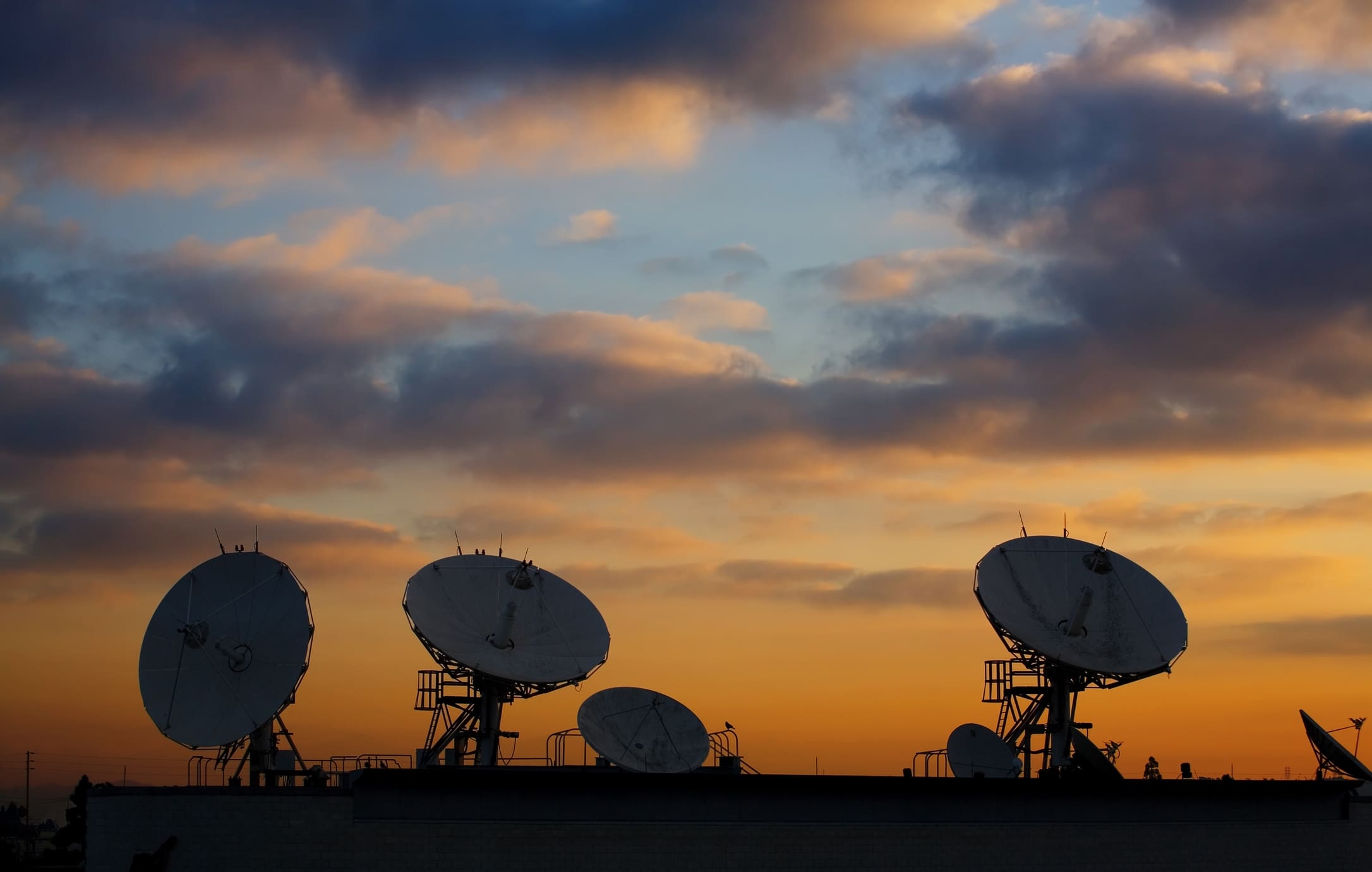
Get in touch
Whether you’re starting a new project or need expert guidance, we’re here to find the perfect solution for your needs. Reach out to us now and start the conversation!
